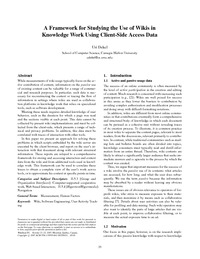A Framework for Studying the Use of Wikis in Knowledge Work Using Client-Side Access DataUri Dekel
Zu finden in: WikiSym 2007 (Seite 25 bis 30), 2007
|
 |
 Diese Seite wurde seit 13 Jahren inhaltlich nicht mehr aktualisiert.
Unter Umständen ist sie nicht mehr aktuell.
Diese Seite wurde seit 13 Jahren inhaltlich nicht mehr aktualisiert.
Unter Umständen ist sie nicht mehr aktuell.
 Zusammenfassungen
Zusammenfassungen
While measurements of wiki usage typically focus on the active contribution of content, information on the passive use of existing content can be valuable for a range of commercial and research purposes. In particular, such data is necessary for reconstructing the context or tracing the flow of information in settings where wikis are used as collaboration platforms in knowledge work that relies on specialized tools, such as software development.
Meeting these needs requires detailed knowledge of user behavior, such as the duration for which a page was read and the sections visible at each point. This data cannot be collected by present wiki implementations and must be collected from the client-side, which presents a range of technical and privacy problems. In addition, this data must be correlated with traces of interaction with other tools.
In this paper we present an approach for solving these problems in which scripts embedded by the wiki server are executed by the client browser, and report on the user’s interaction with that document along with relevant structural information. These reports are relayed to a comprehensive framework for storing and accessing interaction and context data from the wiki and from additional tools used in knowledge work. This framework can be used to correlate these traces to obtain a complete view of the user’s work across tools, or to approximate his context at specific points in time.
Von Uri Dekel im Konferenz-Band WikiSym 2007 (2007) im Text A Framework for Studying the Use of Wikis in Knowledge Work Using Client-Side Access Data Meeting these needs requires detailed knowledge of user behavior, such as the duration for which a page was read and the sections visible at each point. This data cannot be collected by present wiki implementations and must be collected from the client-side, which presents a range of technical and privacy problems. In addition, this data must be correlated with traces of interaction with other tools.
In this paper we present an approach for solving these problems in which scripts embedded by the wiki server are executed by the client browser, and report on the user’s interaction with that document along with relevant structural information. These reports are relayed to a comprehensive framework for storing and accessing interaction and context data from the wiki and from additional tools used in knowledge work. This framework can be used to correlate these traces to obtain a complete view of the user’s work across tools, or to approximate his context at specific points in time.
 Bemerkungen
Bemerkungen
 Leider ist die ursprünglich im Biblionetz erfasste URL eines Volltextes seit mehr als sechs Monaten nicht mehr gültig (Fehlermeldung 404) und wurde deshalb gelöscht. Es ist mir nicht bekannt, ob das Dokument unter einer anderen Adresse noch frei auf dem Internet verfügbar ist.
Leider ist die ursprünglich im Biblionetz erfasste URL eines Volltextes seit mehr als sechs Monaten nicht mehr gültig (Fehlermeldung 404) und wurde deshalb gelöscht. Es ist mir nicht bekannt, ob das Dokument unter einer anderen Adresse noch frei auf dem Internet verfügbar ist. Dieses Konferenz-Paper erwähnt ...
Dieses Konferenz-Paper erwähnt ...
 Personen KB IB clear | Silvan Reinhold | ||||||||||||||||||
 Begriffe KB IB clear | Browserbrowser
, Evaluationevaluation
, HTMLHTML
, MediaWiki
, SnipSnap
,  Software Software software
, software
,  TWiki
, Wikiwiki
, Wiki in educationWiki in education TWiki
, Wikiwiki
, Wiki in educationWiki in education
| ||||||||||||||||||
 Bücher |
| ||||||||||||||||||
 Texte |
|
 Tagcloud
Tagcloud
 Zitationsgraph
Zitationsgraph
 Zitationsgraph (Beta-Test mit vis.js)
Zitationsgraph (Beta-Test mit vis.js)
 Volltext dieses Dokuments
Volltext dieses Dokuments
 | A Framework for Studying the Use of Wikis in Knowledge Work Using Client-Side Access Data: Artikel als Volltext ( : :  , 140 kByte) , 140 kByte) |
 Anderswo suchen
Anderswo suchen 
 Beat und dieses Konferenz-Paper
Beat und dieses Konferenz-Paper
Beat hat Dieses Konferenz-Paper während seiner Zeit am Institut für Medien und Schule (IMS) ins Biblionetz aufgenommen. Beat besitzt kein physisches, aber ein digitales Exemplar. (das er aber aus Urheberrechtsgründen nicht einfach weitergeben darf). Es gibt bisher nur wenige Objekte im Biblionetz, die dieses Werk zitieren.










 Biblionetz-History
Biblionetz-History